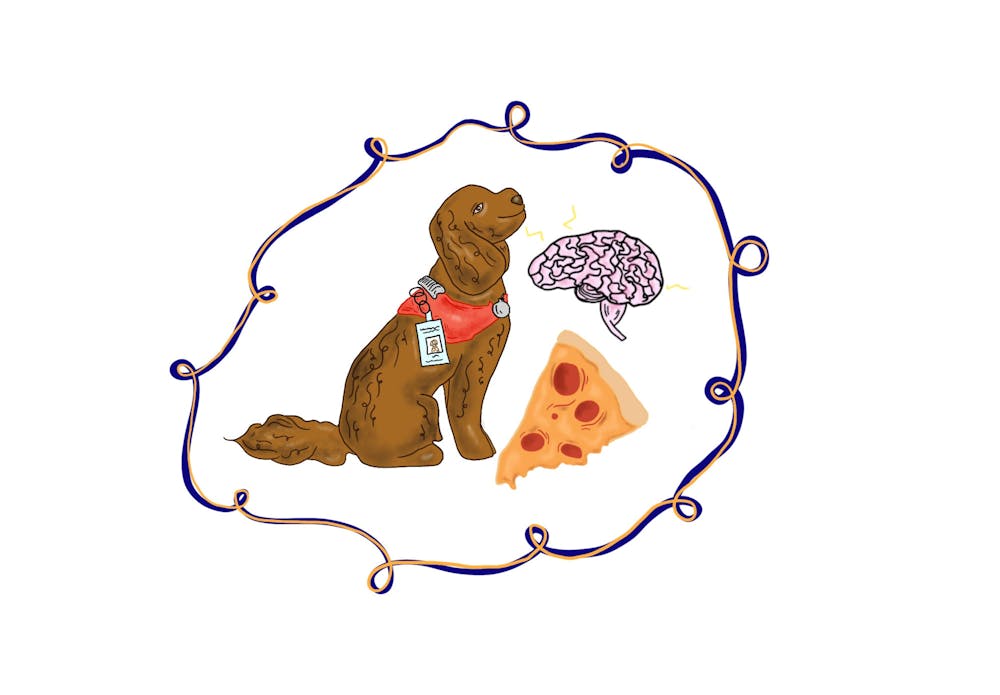The University's Counseling & Psychological Services and Peer Health Educators joined forces Feb. 21 to host another Mental Wellness Screening Day as part of an ongoing effort to prioritize mental health on Grounds. These events, currently held once every semester at the Student Health and Wellness Building from 11 a.m. to 3 p.m., include screenings by professionals for various mental health disorders, as well as activities such as yoga, pizza, therapy dogs and outdoor adventure tabling. Afterward, participants are given a resource packet that guides them to other resources to support their mental well-being.
In an email statement to The Cavalier Daily, SHW representatives David Yost, Trinley Palmo and Ally Gago said that screening events such as these affirm that students deserve and have access to help.
“MWSD helps reduce stigma, promotes preventive care, educates U.Va. students about all their mental health treatment options, helps to make treatment providers seem more approachable and [provides services for] students who might not otherwise seek out treatment on their own,” the representatives said.
Subhi Saibaba, events and partnerships intern for PHE and fourth-year College student, said the event aims to draw attention to the topic of mental wellness for the whole University, especially those who have never received mental health care before.
“[Students] are able to get that initial interaction, that first foot in the door, and that can help them decide whether they would personally benefit from seeking professional help,” Saibaba said.
The SHW representatives said that different programs within SHW, such as CAPS and PHE, play a role in ensuring the effectiveness of the program. CAPS takes charge of the event’s clinical aspects and assists with the logistics of the planning process, providing essential support through screening tools, recruiting, training clinical volunteers and developing the resource packet distributed to participants at the end of each program. PHE members provide operational support, taking care of responsibilities such as check-in and check-out processes, matching counselors with participants and ensuring a positive experience for attendees of the program.
Ranya Fischer, peer health educator and third-year College student, said the outreach provided by PHE during MWSD is important in making mental health resources accessible and providing education on a variety of topics that are relevant to students.
“Our role in the Mental Wellness Screening Days is to help facilitate what goes on and be a contact point for students. I think people tend to find us more approachable, so we help check people in and guide them through the process,” Fischer said. “It can be kind of scary, reaching out for help from people especially if you're not familiar with the process and how CAPS works here at U.Va., so we guide people through and point them to resources if they need it.”
SHW representatives said that the role of Peer Health Educators in the program has expanded this year, with educators participating in pre-event marketing for MWSD. They added that some educators make use of the program’s services themselves in an effort to normalize the screening process that is central to the event. The representatives also said that PHE have made strides in advertising MWSD through various channels including signage at student centers, social media posts, newsletters, handbilling and word-of-mouth advertising.
SHW provides both interpersonal support from PHE and professional screenings in order to enhance the effectiveness of programs like MWSD, according to the representatives.
“Our counseling professionals and peer health educators are the perfect match to ensure our students are being screened by clinically licensed professionals, while embracing peer support and leadership from the PHEs,” the representatives said.
As organizers of the MWSD program transitioned to their new base of operations — now hosting the events in the SHW building after previously being held in Newcomb Hall — SHW representatives said each iteration of the event provides valuable insights that help the program improve. They added that they aim to embrace a holistic model of well-being, and that they want to expand their wellness efforts through enhanced MWSD programming.
“We want to keep expanding our message about mental wellness with information and resources about physical, social, academic and spiritual wellness." the representatives said.
Despite strong efforts, the challenge of garnering participation — particularly from upperclassmen and graduate students — persists. According to SHW representatives, while many of these students are already familiar with SHW services, they suspect there is a considerable group of students within this population that are not being reached. The SHW representatives said that to address this challenge, the organization has been specifically targeting these students in their promotion of the MWSD program.
“We’ve targeted these groups specifically and that’s [helped move] the needle a bit but, we’re always working on creative and strategic ways to overcome obstacles,” SHW representatives said.
SHW representatives said holding MWSD multiple times each year increases awareness about the mental health services SHW offers.
Though the next MWSD has yet to be scheduled, SHW looks forward to putting together another interation of this event next semester for the University community, which will be welcoming a new cohort of students.
“There will be a whole new community of students who haven’t heard this message and it’s important for them to hear — your mental wellness matters to us,” the representatives said.







